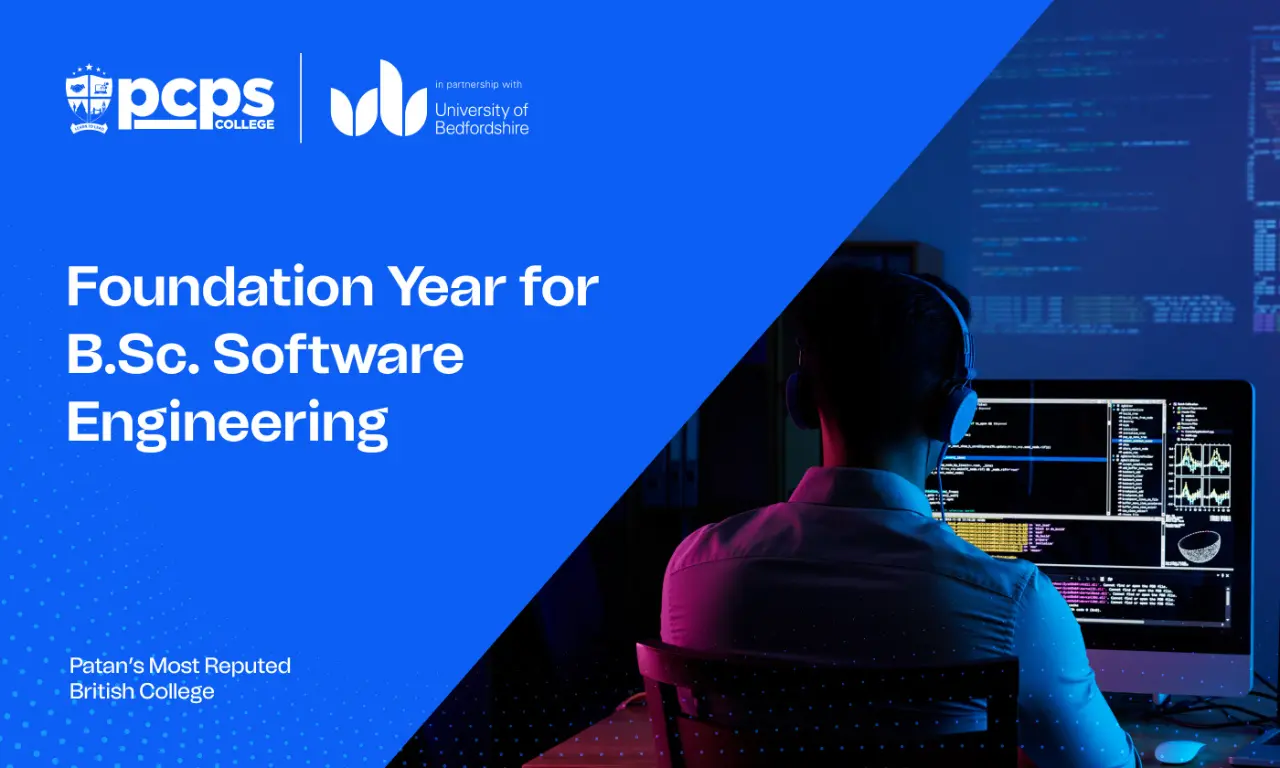About Course
Software engineering is central to the success of most modern
businesses. This broad-based course covers the entire software
engineering cycle, giving you the vocational skills you need to take on
specialist roles, from developer or programmer to IT technical support.
Study the design, development and deployment of large-scale software
within industrial and commercial settings, building your understanding
of the lifecycle of systems and how they fit into management and
organizational contexts.
In your first year, you gain a solid foundation in databases and
computer networks, software engineering, computational thinking,
programming and data structures. Moving forward, you then have the
opportunity for specialist study in areas such as desktop applications
development, mobile application development, web technologies and
software for enterprise. Your final-year project will allow you to work
with greater focus, opening up the possibility of conducting further
research in the future.
Why B.Sc Software Engineering?
- It is broad based but has the depth to give you the vocational skills required for a career in software engineering
- Explore the theory of software engineering then apply it to real-life situations
- Challenge conventional thinking as you develop your own solutions to many issues that face software engineering
- Benefit from the teaching experience of an academic team with strong research backgrounds, actively engaged in supporting local businesses and organizations
- The course shares a first year with other associated BSc degrees, giving you the chance to exchange ideas and knowledge with students from other disciplines
- Develop into a reflective practitioner with the skills to manage projects in an organizational setting
- Take the course over four years and include a fee-free year in industry (see below), building your experience and making contacts for the future
- If you need a step-up into higher education, start with a Foundation Year (see below) which guarantees you place on the degree course
Distinctive Features
- Broadly based yet enough depth (programming skills, testing skills etc.) so as to give you credible vocational skills in Software Engineering.
- Coverage of the entire Software Engineering life cycle and comprehensive skills in applied programming and in applied Software Engineering topics.
- Taught by staff with both a strong academic research background who’re also actively engaged in knowledge transfer (e.g. to local SME’s), and who are at the forefront of their field.
- Emphasis on the life cycle but also in-depth skills such as programming and analysis.
Career / Future Opportunities
- Application Analyst
- Application Developer
- Data Analyst
- Database Administrator
- Games Developer
- Information Systems Manager
- IT Consultant
- Multimedia Programmer
- SEO Specialist
- Systems Analysts
- UX Designer
- Web Designer
- Web Developer
- Digital Copywriter
- IT Sales Professional
- IT Trainer
- Nanotechnologist
- Network Engineer
- Social Media Manager
- Technical Author
- Web Content Author
B.Sc Software Engineering will equip you to develop the
intellectual and pragmatic skills needed to develop quality software
artefacts that
not only function, and meet client requirements, but also fit within the
pragmatic
constraints
Recent graduates have obtained a variety of graduate trainee positions both
in
industry and the public sector, with good prospects for further promotion in
a
competitive job market.
Initially, you are likely to gain roles such as a trainee skilled
practitioner with the
prospect for later progression leading to posts of responsibility
supervising work within a team-based development and support settings within
industrial and
commercial settings.
From the game developers to manager of IT and communications services, you
will
have a range of opportunities open to you as a BSc(Hons) CS & SE graduate.
Jobs related to your degree are:
Jobs where your degree would be useful are:
Course Structure
B.Sc. (Hons.) in Software Engineering
| Unit Code | Level | Unit Name | Credits |
|---|---|---|---|
| CIS095-1 | 4 | Fundamentals Of Software Engineering | 30 |
| CIS096-1 | 4 | Mathematics And Concepts for Computational Thinking | 30 |
| CIS093-1 | 4 | Databases and Computer Networks | 30 |
| CIS092-1 | 4 | Principles Of Programming and Data Structures | 30 |
| CIS099-2 | 5 | Mobile Application Development | 30 |
| CIS116-2 | 5 | Desktop Applications Development and Software Engineering | 30 |
| CIS046-3 | 5 | Decision Support Systems and Data Mining | 30 |
| CIS051-2 | 5 | Web Technologies and Platforms | 30 |
| CIS007-2 | 6 | Software for Enterprise | 30 |
| CIS050-3 | 6 | Agile Project Management | 30 |
| CIS047-3 | 6 | Undergraduate Project (UG) | 30 |
| CIS050-3 | 6 | Research Methodology (RM) | 30 |
-
Year-1
-
Coursework (Projects, Assessments)58%
-
Written Exam14%
-
Practical Exam28%
-
-
Year-2
-
Coursework (Projects, Assessments)43%
-
Written Exam44%
-
Practical Exam13%
-
-
Year-3
-
Coursework (Projects, Assessments)86%
-
Written Exam14%
-
Entry Requirement
The basic criteria required for entry to the courses are listed as follows: The applicants should have any of the following:
- Successfully pass Plus 2 with minimum 55% OR 2.2 GPA in Grade XII and minimum C in individual subject
- OR 2 A level passes (with minimum C and D Grades)
- OR Successfully complete Foundation year (from a recognized university or HE institution)
English language requirements are as follows:
- English language requirements are as follows:
- OR Nepalese High School 12th English minimum 60% or B Grade
- University of Bedfordshire ELAS with minimum of B+ Grade.
Intake
- Jan-Feb Intake
- Sept-Oct Intake

